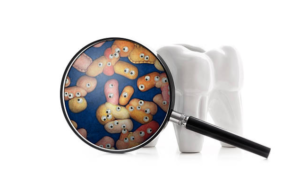
Periodontal disease is an infection and inflammation of the gums that damages the soft tissue between the teeth. If left untreated, this condition can cause teeth to loosen or lead to tooth loss. According to the Centers for Disease Control and Prevention (CDC), 47.2% of adults aged 30 or older and 70.1% of adults aged 65 or older suffer from periodontal disease.
While periodontal disease is common, it is preventable through proper oral hygiene and treatment. By having regular dental checkups, you can prevent periodontal disease from affecting your oral health.
Are there any long-term effects of periodontal disease?
Periodontal disease begins with gingivitis. The gum tissue might look red and swollen, causing bad breath. If left untreated, it can lead to mild to moderate periodontitis, characterized by infections and bleeding gums.
As periodontal disease progresses, tartar and bacteria get deeper into the gums and damage the bone and ligaments underneath. Eventually, this results in receding gums, bone damage, and tooth loss.
Periodontitis affects more than just your oral health. As bacteria and tartar grow in your mouth, they can enter your bloodstream and travel throughout your body, causing health problems such as arthritis, heart disease, stroke, and diabetes. Periodontal disease should be treated before it negatively affects your overall health.
Common causes and risk factors
You are at a higher risk of gum disease if you have the following factors:
- Poor oral hygiene
- Poor nutrition, including a lack of vitamin C
- Medication that causes dry mouth or affects the gums
- Having a family history of periodontitis
- Clenching and grinding your teeth on a regular basis
- Tobacco use, whether smoking or chewing
- Hormonal changes
- Avoiding routine dental examinations and cleanings
- Conditions such as heart disease, diabetes, osteoporosis, asthma, or kidney disease.
- Cancer treatment, leukemia, and HIV/AIDS can decrease immunity.
Periodontal disease prevention tips
- Brushing: Brushing your teeth after meals helps remove plaque and food particles that have accumulated between your teeth and gums. You should also brush your tongue, as food particles and bacteria can settle there. Make sure your toothbrush is soft-bristled.
- Floss: Be sure to floss between your teeth and gums at least once a day to remove food particles and plaque.
- Mouthwash Rinse: Rinse your mouth with mouthwash to keep it fresh and germ-free.
- Diet: Sugary foods and drinks can cause your mouth to produce acids. Avoid sticky foods that promote bacterial growth.
It is recommended that you see your dentist at least twice a year. You should not wait more than six months between visits. They will examine your teeth, gums, bone structure, and any symptoms or risk factors associated with periodontal disease. Early diagnosis and treatment are the keys to reversing gum disease and preserving your oral health.
Periodontal disease does not have to lead to tooth loss. With the proper care, you can make them last a lifetime. Our Waldorf periodontist will create a treatment and care plan to treat any periodontal problems you may have. Contact our Impant Dentist in Waldorf office today to schedule an appointment.
Karl A. Smith, DDS, MS
Phone: (703) 894-4867
Url: http://drkarlsmith.com/
2500 N. Van Dorn St., Suite 128
Alexandria, VA 22302



